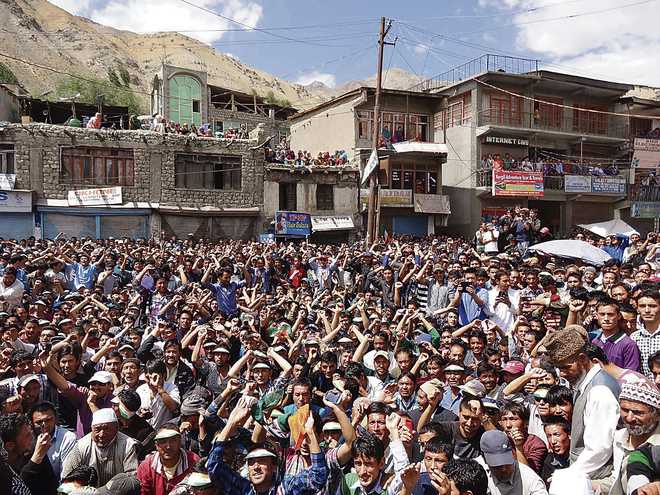
Think long term: Setting up a Divisional Commissioner’s office will go a long way in meeting the regional aspirations of the people of Ladakh.
P Stobdan
Former Ambassador
Protecting Ladakh against prolonged troubles in Kashmir was long overdue and so was the imperative of addressing some of the aspirations of the people there. Ladakh holds 60 per cent of J&K’s territory and plays critical role for national security that can’t be overlooked. Also inconceivable has been how Independent India (at the behest of Nehru) reduced Ladakh’s profile of being one of the five kingdoms in the Himalayas into a mere neglected district of the Valley.
Joseph Korbel, father of former US Secretary of State Madelaine Albright, wrote in 1950 that Kashmiri leadership was playing a trick on the people of Ladakh, if not frightening them to surrender under their control. For seven decades, New Delhi has turned a blind eye to Kashmiri sabre-rattling and the trickery upon the people of Ladakh — perhaps even worse than Pakistanis’ exploitation of the people in Gilgit & Baltistan. In the late 1970s, Sheikh Abdullah drove a wedge between Kargil Shia versus Leh Buddhist, besides creating a nefarious ‘Greater Kashmir’ concept to obliterate Ladakh.
The myth of J&K as a unitary state (a heritage of Dogra fiefdom) has outlived its historical inviolability. India should have thought about doing away with any subjugation links that Ladakh notionally had with J&K. After persistent articulation for the status of a UT, the Union government finally agreed in 1993, as interim measure, to create the Ladakh Autonomous Hill Development Council. In 1995, the Ministry of Law, Justice and Company Affairs announced the Act enacted by the President under the powers conferred by Section 3 of the Jammu and Kashmir State Legislature (Delegation of Powers) Act, 1992, to provide for the establishment of Autonomous Hill Development Councils and an Inter-District Advisory Council in the Ladakh region.
The Act had to be passed during the phase of the third and longest Governor’s Rule (1990-1996). But the Ladakh Autonomous Hill Development Council (LAHDC) Act in 1997, passed by the NC government, was toothless. It was in 2002, during the time of the PDP-led coalition government in J&K, that a semblance of power was devolved to LAHDC of Leh district through an amendment to the 1997 Act.
It was remarkable that then CM, Mufti Sayeed, within two months of his coming to power, decided to delegate greater financial and administrative powers to LAHDC (Leh) and create a similar LAHDC for Kargil as well. Under the new Act, the LAHDC chief executive councillor was given the status and perks of a Cabinet minister and executive councillors of a deputy minister’s rank. The council was empowered to decide on the allotment and distribution of land, superintendence and control over the council employees.
The LAHDCs of Leh and Kargil have been functioning well, rather in an exemplary way since. But in a major decision on September 27, the State Administrative Council (SAC) — equivalent of a Cabinet in Governor’s rule, under the chairmanship of Governor Satya Pal Malik, has approved yet another LAHDC (Amendment) Bill, 2018, to fully empower the councils with greater administrative and financial powers. Inter alia, the amendments gave more powers to the LAHDC to levy and collect taxes, more administrative control over the staff and more allocation and flow of funds from Centrally-sponsored schemes.
While the people of Ladakh had been seeking a separate legislative arrangement in the form of a UT status since 1951, which the ruling BJP agreed to fulfil prior to 2014, constitutional changes seem unattainable. Since the matter is perceived as linked with the Kashmir issue, it can’t be realised for now. Regions like Ladakh, which are in favour of deeper integration with the national mainstream, cannot be allowed to drift against the current context of destabilising forces in the state.
The Centre also cannot punish the region any longer on the ground of its demographic deficiency (low weight in electoral politics). Considering Ladakh’s geo-strategic significance and in the light of Pakistan recently promulgating the Gilgit Baltistan Order 2018 (entrusting it with an assembly with legislative power) a change in Ladakh is critical. New Delhi has to be mindful of China blustering its way through the region under its CPEC projects which will have direct consequences for Ladakh.
While UT status would remain a long-drawn process, strategic articulation and national security imperative should propel the government to upgrade the administrative status of Ladakh at least to a divisional level. Currently, only a DC-level officer in Leh and Kargil acts as the chief executive officer of the respective council, who, in turn, reports to the Divisional Commissioner of Kashmir and Ladakh based in Srinagar. The Commissioner sitting in Kashmir supervises and controls 12 districts, including Leh and Kargil, in terms of administrative, developmental and law and order situation.
Separating Ladakh from Kashmir Division and setting up a Divisional Commissioner’s office will go a long way in meeting the regional aspirations of the people. The launch of the overarching national vision of a tunnel through Zoji La (11,578 ft), connecting the Valley with Ladakh, in addition to building a high-elevation all-weather Bilaspur-Manali-Leh rail axis and Srinagar-Kargil-Leh axis will go a long way in removing Ladakh’s isolation. The projects are of great strategic, economic and developmental significance. The biggest spin-off will be the region opening up to better influx for tourism.



























